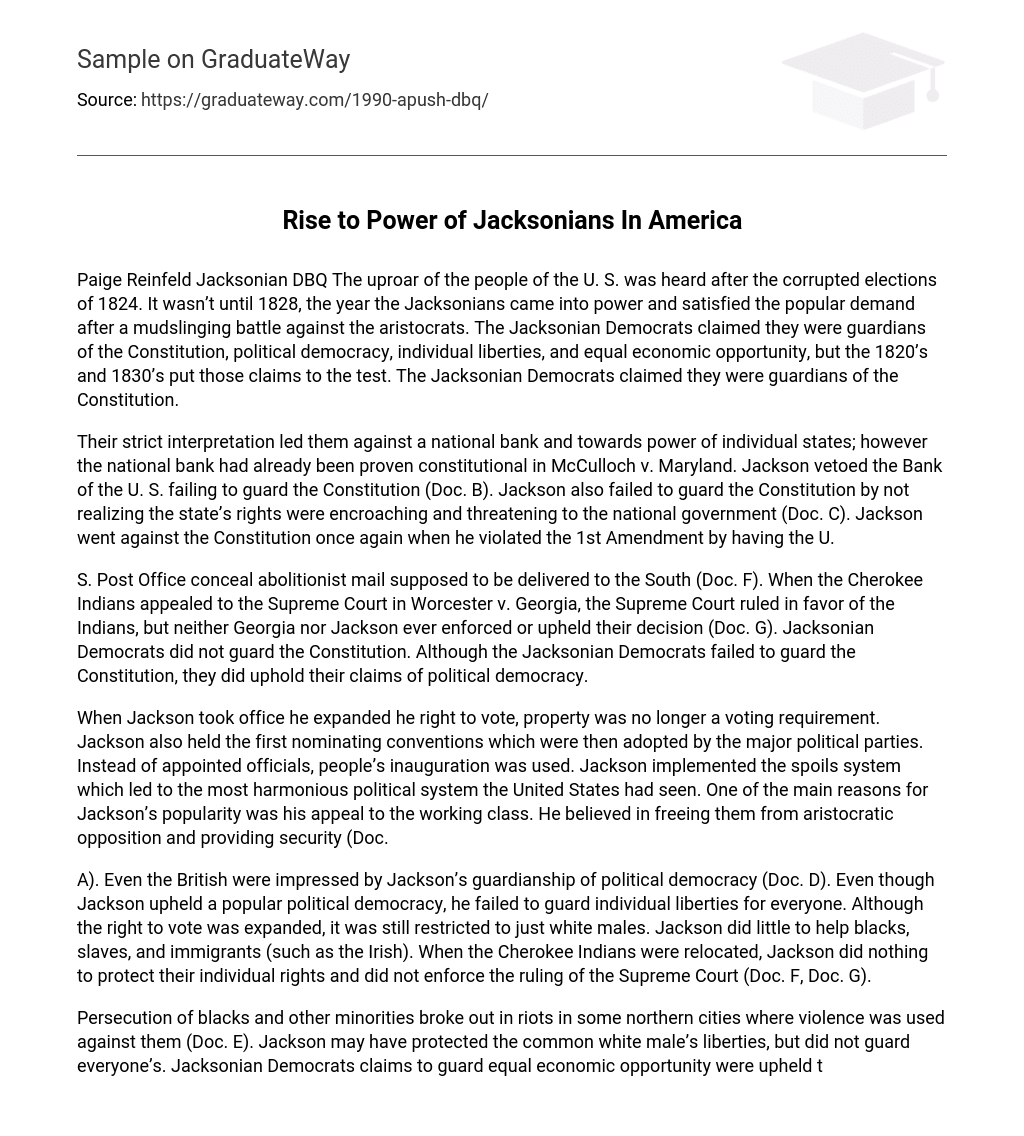The American citizens expressed their discontent after the fraudulent elections of 1824, but it was not until 1828 that the Jacksonians gained power and addressed the majority’s demands amidst a fierce political struggle against the privileged class. The Jacksonian Democrats declared themselves as champions of the Constitution, democracy, individual liberties, and economic equality. However, these assertions were challenged throughout the 1820s and 1830s. Nonetheless, the Jacksonian Democrats consistently emphasized their commitment to protecting the Constitution.
Their strict interpretation led them to oppose a national bank and support the power of individual states. However, it had already been established that the national bank was constitutional in the case of McCulloch v. Maryland. Jackson vetoed the Bank of the U.S., failing to protect the Constitution (Doc. B). He also failed to protect the Constitution by not recognizing that the states’ rights were encroaching on and threatening the national government (Doc. C). Additionally, Jackson violated the 1st Amendment by involving the U.S.
The mail intended for abolitionists in the South was covertly hidden by the S. Post Office (Doc. F). In the case of Worcester v. Georgia, when the Cherokee Indians sought justice from the Supreme Court, the court ruled in their favor. However, both Georgia and President Jackson ignored this decision and did not enforce it (Doc. G). While the Jacksonian Democrats failed in their duty to protect the Constitution, they did follow through with their pursuit of political democracy.
When Jackson was elected, he expanded the right to vote by removing the requirement of property ownership. Additionally, he introduced the concept of nominating conventions, which later became common practice for major political parties. Instead of appointing officials, Jackson allowed the people to participate in the inauguration process. He also implemented the spoils system, resulting in a more harmonious political system. What made Jackson particularly popular was his support for the working class, as he aimed to liberate them from aristocratic opposition and ensure their security (Doc.
A). While the British were impressed by Jackson’s preservation of political democracy (Doc. D), he disregarded the safeguarding of individual liberties for all. Despite the expansion of the right to vote, it remained limited exclusively to white males. Jackson offered little assistance to blacks, slaves, and immigrants, including the Irish. Moreover, when the Cherokee Indians were forced to move, Jackson took no actions to defend their individual rights or uphold the Supreme Court’s verdict (Doc. F, Doc. G).
During the 1820’s and 1830’s, riots occurred in some northern cities where violence was directed towards blacks and other minorities, illustrating the persecution they faced (Doc. E). Although Jacksonian Democrats claimed to protect equal economic opportunity, their actions did not guarantee this for everyone. By vetoing the national bank, Jackson aimed to safeguard the common people from an economy controlled by the wealthy or foreigners, emphasizing his belief in equal opportunity for all (Doc. B). This notion is exemplified in the Supreme Court Case Bridge v.
Bridge, Jackson promoted economic stability by ensuring that no company had exclusive privileges and protecting equal economic opportunities (Doc. H). Ultimately, all of Jacksonian’s assertions as protectors of the Constitution, political democracy, individual freedoms, and equal economic opportunities were challenged. Despite Jackson’s failure to enforce Supreme Court rulings and his absence of a centralized banking system, he united the Democratic Party and bolstered the influence of ordinary white men, demonstrating that anyone with the correct ambition could attain office.





